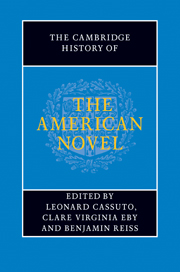Book contents
- Frontmatter
- General Introduction
- PART ONE INVENTING THE AMERICAN NOVEL
- PART TWO REALISM, PROTEST, ACCOMMODATION
- PART THREE MODERNISM AND BEYOND
- Introduction: modernism and beyond
- 37 Stein, Hemingway, and American modernisms
- 38 The Great Gatsby and the 1920s
- 39 Philosophy and the American novel
- 40 Steinbeck and the proletarian novel
- 41 The novel, mass culture, mass media
- 42 Wright, Hurston, and the direction of the African American novel
- 43 Ellison and Baldwin: aesthetics, activism, and the social order
- 44 Religion and the twentieth-century American novel
- 45 Faulkner and the Southern novel
- 46 Law and the American novel
- 47 Twentieth-century publishing and the rise of the paperback
- 48 The novel of crime, mystery, and suspense
- 49 US novels and US wars
- 50 Science fiction
- 51 Female genre fiction in the twentieth century
- 52 Children's novels
- 53 The American novel and the rise of the suburbs
- 54 The Jewish great American novel
- 55 The Beats and the 1960s
- 56 Literary feminisms
- 57 Reimagining genders and sexualities
- PART FOUR CONTEMPORARY FORMATIONS
- A selected bibliography
- Index
46 - Law and the American novel
from PART THREE - MODERNISM AND BEYOND
Published online by Cambridge University Press: 28 July 2011
- Frontmatter
- General Introduction
- PART ONE INVENTING THE AMERICAN NOVEL
- PART TWO REALISM, PROTEST, ACCOMMODATION
- PART THREE MODERNISM AND BEYOND
- Introduction: modernism and beyond
- 37 Stein, Hemingway, and American modernisms
- 38 The Great Gatsby and the 1920s
- 39 Philosophy and the American novel
- 40 Steinbeck and the proletarian novel
- 41 The novel, mass culture, mass media
- 42 Wright, Hurston, and the direction of the African American novel
- 43 Ellison and Baldwin: aesthetics, activism, and the social order
- 44 Religion and the twentieth-century American novel
- 45 Faulkner and the Southern novel
- 46 Law and the American novel
- 47 Twentieth-century publishing and the rise of the paperback
- 48 The novel of crime, mystery, and suspense
- 49 US novels and US wars
- 50 Science fiction
- 51 Female genre fiction in the twentieth century
- 52 Children's novels
- 53 The American novel and the rise of the suburbs
- 54 The Jewish great American novel
- 55 The Beats and the 1960s
- 56 Literary feminisms
- 57 Reimagining genders and sexualities
- PART FOUR CONTEMPORARY FORMATIONS
- A selected bibliography
- Index
Summary
From Hugh Henry Brackenridge's Modern Chivalry (1792–1815) to William Gaddis's A Frolic of His Own (1994), legal figures and themes are nearly ubiquitous in American fiction. Similarities between the two discourses suggest a reason why. Law and fiction both use narrative form to establish or challenge values, norms, and ideas of order. As Robert Cover, a legal scholar, observes, “No set of legal institutions exists apart from the narratives that locate it and give it meaning.” Allan Hutchinson expands on Cover's theme: “We are never not in a story. History and human action only take on meaning and intelligibility within their narrative context and dramatic settings.” As storytelling enterprises, law and fiction offer ways to “mediate our engagement in the world with others,” providing “the possibilities and parameters of our self-definition and understanding.” Given the overlap between law and fiction as normative and narrative projects, the presence of law in literary narratives and of literary narratives in legal reasoning seems unsurprising, even inevitable. Because of the heterogeneity and changing composition of the American populace, legal and literary narratives provide particularly important means of formulating fundamental values, such as equality and justice.
Novelists are also plainly drawn to the peculiarities of the law: its forms, specialized rules and vocabulary, as well as its need to be predictable and to furnish a degree of certainty in its results. Law novels often feature descriptions of the formalities of courtroom procedure and specialized concepts and phrases (e.g., the title of Gaddis's A Frolic of His Own points to doctrine limiting the liability of a master for the wrongful behavior of a servant acting outside the scope of his agency).
- Type
- Chapter
- Information
- The Cambridge History of the American Novel , pp. 767 - 780Publisher: Cambridge University PressPrint publication year: 2011



